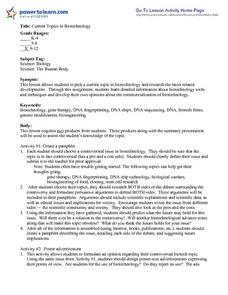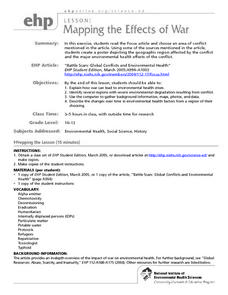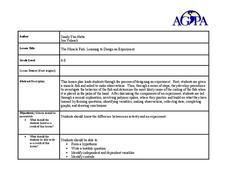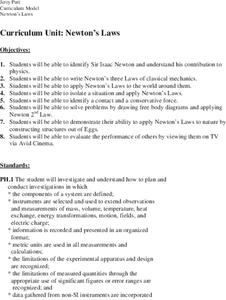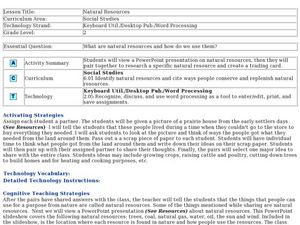Curated OER
Melting, Freezing, and More!: Phase Transitions
Third graders listen to a talk on phase transitions and view three demonstrations. In this phases of matter lesson plan, 3rd graders complete a worksheet as they listen about phase transitions. They move through three demonstrations of...
Curated OER
"The Yeast of Our Worries"
Pupils study yeasts or cellular respiration in this inquiry activity. They examine different types of bread to show which rise or do not. They measure the amount of carbon dioxide released by the yeasts when using different sweeteners.
Curated OER
Classroom Heart Rates
Pupils check and record heart-rates of other classmates. They compare and design questions to explain the differences in their findings. Possible explanations might include: the effects of culture, lifestyles, age and gender on heart rate.
Curated OER
Fish Haunts
Students examine some of the different ecosystems that fish live in. While doing this they identify the species of fish and the ecological conditions needed for survival. Students use research resources to make fish cards that have...
Curated OER
Current Topics in Biotechnology
Eleventh graders are introduced to the concept of biotechnology. Using the internet, they research the latest developments in this field and the tools used by biotechnologists. They share their information with the class and create a...
Curated OER
Mapping the Effects of War
Students examine how war can lead to environmental health crises. They read an article, conduct research on a region from the article, and create a poster to depict the geographic region and the environmental health effects of the conflict.
Curated OER
Life in a Cup
Third graders make and maintain a mini terrarium. They keep a daily journal of what happens in their terrarium and record daily observations and measurements.
Curated OER
Nurture Poetry
Students create a poetry book. In this poetry instructional activity, students write a cinquain poem, name poem, haiku, limerick, and preposition poem.
Curated OER
The Miracle Fish: Learning to Design an Experiment
Young scholars develop procedures to explore the behavior of fish. In this scientific experiment lesson students from a hypothesis, write a question, identify different variables and controls in their experiment.
Curated OER
Linking Algebra to Temperature
Students convert between two units as they calculate the temperature. In this algebra lesson, students collect data on seasonal climate and create a graph. They make conjectures based on their data collection.
Curated OER
Mission Impossible! Are We Alone in the Universe, or Are We Just One of Its Citizens?
Students examine NASA strategy for scientifically studying any celestial body. They brainstorm about all previous space explorations and missions they can recall, and propose an expedition plan to become space explorers of the future.
Curated OER
Building a Pill Bug Palace
Students make "pets" of isopods (potato bugs) to determine their preferred environment and food sources. They record their results on a bar graph and in a scientific report.
Curated OER
Identifying Acids and Bases
Sixth graders observe the physical and chemical change that can occur in an acid and a base. In this acids and bases lesson plan, 6th graders use cabbage juice to identify, compare, and contrast acids and bases.
Curated OER
Newton's Laws
Students examine and discuss Newton's Laws and discover his contribution to physics. In groups, they participate in an experiment in which they much apply the Laws to the world around them. They describe contact and conservative forces...
Curated OER
When Push Comes to Crunch
Eighth graders engage in an experiment which uses an inclined plane and balls of various masses to determine the effect a large object has on a small object. They study velocity, momentum, gravity and forces.
Curated OER
Environmental Health Impromptu Talk
Students learn the criteria for and create the framework of an impromptu speech about an environmental health issue that is especially important to them. Students write a speech about an environmental health problem based on the material...
Curated OER
Investigation 8 - Weather Forecasts
Fourth graders examine how to predict and evaluate weather forecasts. Discuss with students why weather predictions are important to us. Ask them what people do after they hear a forecast. They brainstorm reasons forecasts are important...
Curated OER
Death at Jamestown
Students use primary source documents to develop a theory about what happened at Jamestown. They use the internet to gather information about the colony. They evaluate the theory of Dr. Hancock as well.
Curated OER
The Right Chemistry
Students see that chemistry is the study of matter, how matter reacts and combines to create new chemicals, the changes that take place in matter and what makes up matter. This lesson provides many good ideas across the curriculum to...
Curated OER
Natural Resources
Fifth graders begin the lesson by identifying the different types of natural resources. As a class, they discuss how environments are destructed and how the loss of one natural resource can affect the economy. Using a map, they label the...
Curated OER
Scholarship and Learning in Islam
Students explain what a madrasah represents in Islam. Using the Muslim world as an example, they identify and describe two or more centers of learning. They explain the contributions that Muslims have made to science and math and...
Curated OER
Blue Genes: Affect Your Life!
Students, in groups, research, analyze and synthesize information on genetic diseases. After watching a video on genetics, groups perform research on a variety of genetic diseases and present their findings to the class.
Curated OER
757 Glider Kit
Students work together to complete a 757 Glider kit. They use a GPS to discover how it operates in all weather landings. They complete different obstacles with the glider as well.
Curated OER
Reel Projects
Students investigate projectile motion. In this projectile motion lesson, students investigate a website with an interactive lesson. Students view the changes in the projectile they see in the lesson. Students watch short video clips and...




